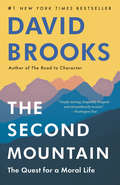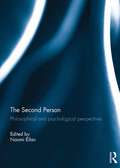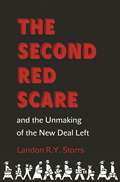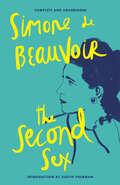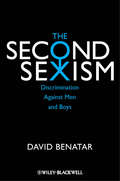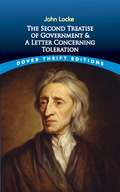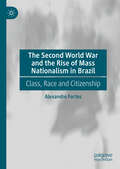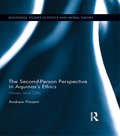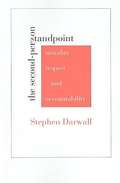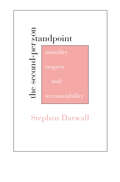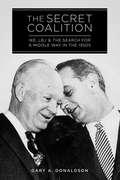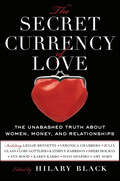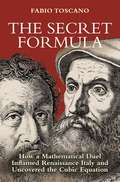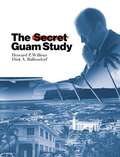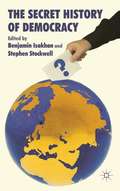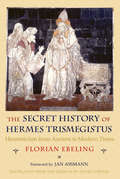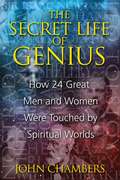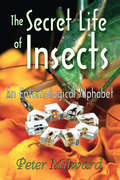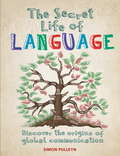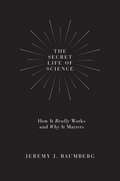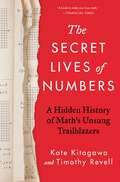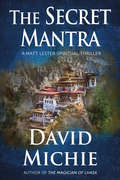- Table View
- List View
The Second Mountain: The Quest for a Moral Life
by David BrooksEverybody tells you to live for a cause larger than yourself, but how exactly do you do it? The bestselling author of The Road to Character explores what it takes to lead a meaningful life in a self-centered world. Every so often, you meet people who radiate joy—who seem to know why they were put on this earth, who glow with a kind of inner light. <P><P>Life, for these people, has often followed what we might think of as a two-mountain shape. They get out of school, they start a career, and they begin climbing the mountain they thought they were meant to climb. <P><P>Their goals on this first mountain are the ones our culture endorses: to be a success, to make your mark, to experience personal happiness. But when they get to the top of that mountain, something happens. They look around and find the view . . . unsatisfying. They realize: This wasn’t my mountain after all. There’s another, bigger mountain out there that is actually my mountain. <P><P>And so they embark on a new journey. On the second mountain, life moves from self-centered to other-centered. They want the things that are truly worth wanting, not the things other people tell them to want. They embrace a life of interdependence, not independence. They surrender to a life of commitment. <P><P> In The Second Mountain, David Brooks explores the four commitments that define a life of meaning and purpose: to a spouse and family, to a vocation, to a philosophy or faith, and to a community. Our personal fulfillment depends on how well we choose and execute these commitments. <P><P>Brooks looks at a range of people who have lived joyous, committed lives, and who have embraced the necessity and beauty of dependence. He gathers their wisdom on how to choose a partner, how to pick a vocation, how to live out a philosophy, and how we can begin to integrate our commitments into one overriding purpose. In short, this book is meant to help us all lead more meaningful lives. <P><P>But it’s also a provocative social commentary. We live in a society, Brooks argues, that celebrates freedom, that tells us to be true to ourselves, at the expense of surrendering to a cause, rooting ourselves in a neighborhood, binding ourselves to others by social solidarity and love. <P><P>We have taken individualism to the extreme—and in the process we have torn the social fabric in a thousand different ways. The path to repair is through making deeper commitments. In The Second Mountain, Brooks shows what can happen when we put commitment-making at the center of our lives. <P><b>A New York Times Bestseller</b>
The Second Person: Philosophical and Psychological Perspectives
by Naomi EilanThe past few years have witnessed an exponentially growing body of work conducted under the ‘second person’ heading. This idea has been explored in various areas of philosophy (philosophy of mind, philosophy of language, ethics, epistemology), in developmental psychology, in psychiatry, and even in neuroscience. We may call this interest in the second person the ‘You Turn’. To put it at its most general, and ambitious, the idea driving much of the work is this: proper attention to the ways in which we relate to one another when we stand in second person relation to each other can deliver something like a paradigm shift in the way in which we address questions about a range of fundamental issues in these fields. There is, however, very little agreement about what second person relations are, and a huge variation in why people think they are important. The contributions to this book focus on developing key second-person claims in the philosophy of mind, ethics and epistemology, with the aim of beginning to provide a framework for assessing and relating the multitude of fascinating new questions that come up under the second person heading.This book was originally published as a special issue of Philosophical Explorations.
The Second Red Scare and the Unmaking of the New Deal Left (Politics and Society in Modern America #88)
by Landon R.Y. StorrsHow Red Scare politics undermined the reform potential of the New DealIn the name of protecting Americans from Soviet espionage, the post-1945 Red Scare curtailed the reform agenda of the New Deal. The crisis of the Great Depression had brought into government a group of policy experts who argued that saving democracy required attacking economic and social inequalities. The influence of these men and women within the Franklin D. Roosevelt administration, and their alliances with progressive social movements, elicited a powerful reaction from conservatives, who accused them of being subversives. Landon Storrs draws on newly declassified records of the federal employee loyalty program—created in response to claims that Communists were infiltrating the U.S. government—to reveal how disloyalty charges were used to silence these New Dealers and discredit their policies.Because loyalty investigators rarely distinguished between Communists and other leftists, many noncommunist leftists were forced to leave government or deny their political views. Storrs finds that loyalty defendants were more numerous at higher ranks of the civil service than previously thought, and that many were women, or men with accomplished leftist wives. Uncovering a forceful left-feminist presence in the New Deal, she also shows how opponents on the Right exploited popular hostility to powerful women and their supposedly effeminate spouses. The loyalty program not only destroyed many promising careers, it prohibited discussion of social democratic policy ideas in government circles, narrowing the scope of political discourse to this day.Through a gripping narrative based on remarkable new sources, Storrs demonstrates how the Second Red Scare repressed political debate and constrained U.S. policymaking in fields such as public assistance, national health insurance, labor and consumer protection, civil rights, and international aid.
The Second Sex
by Simone De BeauvoirThe essential masterwork that has provoked and inspired generations of men and women. &“From Eve&’s apple to Virginia Woolf&’s room of her own, Beauvoir&’s treatise remains an essential rallying point, urging self-sufficiency and offering the fruit of knowledge.&” —VogueThis unabridged edition reinstates significant portions of the original French text that were cut in the first English translation. Vital and groundbreaking, Beauvoir&’s pioneering and impressive text remains as pertinent today as when it was first published, and will continue to provoke and inspire generations of men and women to come.
The Second Sexism
by David BenatarDoes sexism against men exist? What it looks like and why we need to take it seriously This book draws attention to the "second sexism," where it exists, how it works and what it looks like, and responds to those who would deny that it exists. Challenging conventional ways of thinking, it examines controversial issues such as sex-based affirmative action, gender roles, and charges of anti-feminism. The book offers an academically rigorous argument in an accessible style, including the careful use of empirical data, and includes examples and engages in a discussion of how sex discrimination against men and boys also undermines the cause for female equality.
The Second Stage
by Betty FriedanFriedan in her book, says that once past the initial phases of working against injustices, the women's movement should focus on working with men to remake private and public planning that work against full lives with children for them.
The Second Treatise of Government and A Letter Concerning Toleration (Dover Thrift Editions Ser.)
by John LockeIn The Second Treatise of Government, John Locke answered two objectives: to refute the concept of the monarchy's divine right and to establish a theory reconciling civil liberties with political order. His Letter Concerning Toleration rests on the same basic principles as his political theory; Locke's main argument for toleration is a corollary of his theory of the nature of civil society. The basis of social and political philosophy for generations, these works laid the foundation of the modern democratic state in England and abroad. Their enduring importance makes them essential reading for students of philosophy, history, and political science.
The Second World War and the Rise of Mass Nationalism in Brazil: Class, Race and Citizenship
by Alexandre FortesThis book reexamines the socioeconomic and political transformation that occurred in Brazil during the 1940s as a result of the Second World War. Integrating social and political history, the author explores the adoption of new policies around state-sponsored industrialisation, the consolidation of Brazilian labour law institutions, and the expanded influence of ‘racial democracy’ in the country's domestic and foreign policy. The book argues that the nature of the Brazilian state and its definitions of citizenship were redefined both from ‘the top’ – as a result of Brazil’s integration in the new international order following the War – and ‘from below’ - as antifascism and mass nationalism opened new spaces for subaltern agency. Challenging traditional narratives on Brazil’s transition from the Estado Novo dictatorship of Getúlio Vargas to a postwar democratic experience, this book highlights the extent to which political developments were shaped by key global processes and foreign relations with the USA. The book also focuses on the ‘bottom-up’ forces and actors that brought about change in Brazil, emphasising the role of workers, protestors, and popular actors in shaping history. Breaking new ground in Brazilian historiography, this book makes a significant contribution to studies of populism and democratisation in Latin America.
The Second-Person Perspective in Aquinas’s Ethics: Virtues and Gifts (Routledge Studies in Ethics and Moral Theory #17)
by Andrew PinsentThomas Aquinas devoted a substantial proportion of his greatest works to the virtues. Yet, despite the availability of these texts (and centuries of commentary), Aquinas’s virtue ethics remains mysterious, leaving readers with many unanswered questions. In this book, Pinsent argues that the key to understanding Aquinas’s approach is to be found in an association between: a) attributes he appends to the virtues, and b) interpersonal capacities investigated by the science of social cognition, especially in the context of autistic spectrum disorder. The book uses this research to argue that Aquinas’s approach to the virtues is radically non-Aristotelian and founded on the concept of second-person relatedness.To demonstrate the explanatory power of this principle, Pinsent shows how the second-person perspective gives interpretation to Aquinas’s descriptions of the virtues and offers a key to long-standing problems, such as the reconciliation of magnanimity and humility. The principle of second-person relatedness also interprets acts that Aquinas describes as the fruition of the virtues. Pinsent concludes by considering how this approach may shape future developments in virtue ethics.
The Second-Person Standpoint: Morality, Respect, and Accountability
by Stephen DarwallStephen Darwall argues, from our failure to appreciate the essentially interpersonal character of moral obligation. After showing how attempts to vindicate morality have tended to change the subject's falling back on non moral values or practical, first-person considerations, Darwall elaborates the interpersonal nature of moral obligations: their inherent link to our responsibilities to one another as members of the moral community. As Darwall defines it, the concept of moral obligation has an irreducibly second-person aspect; it presupposes our authority to make claims and demands on one another. And so too do many other central notions, including those of rights, the dignity of and respect for persons, and the very concept of person itself. The result is nothing less than a fundamental reorientation of moral theory that enables it at last to account for morality's supreme authority, an account that Darwall carries from the realm of theory to the practical world of second-person attitudes, emotions, and actions.
The Second-Person Standpoint: Morality, Respect, and Accountability
by Stephen DarwallWhy should we avoid doing moral wrong? The inability of philosophy to answer this question in a compelling manner—along with the moral skepticism and ethical confusion that ensue—result, Stephen Darwall argues, from our failure to appreciate the essentially interpersonal character of moral obligation. After showing how attempts to vindicate morality have tended to change the subject—falling back on non-moral values or practical, first-person considerations—Darwall elaborates the interpersonal nature of moral obligations: their inherent link to our responsibilities to one another as members of the moral community. As Darwall defines it, the concept of moral obligation has an irreducibly second-person aspect; it presupposes our authority to make claims and demands on one another. And so too do many other central notions, including those of rights, the dignity of and respect for persons, and the very concept of person itself. The result is nothing less than a fundamental reorientation of moral theory that enables it at last to account for morality’s supreme authority—an account that Darwall carries from the realm of theory to the practical world of second-person attitudes, emotions, and actions.
The Secret Coalition: Ike, LBJ, and the Search for a Middle Way in the 1950s
by Gary A. DonaldsonThe politics of the 1950s revolved around two primary leaders, one Republican and one Democrat-both moderate, and both willing to compromise to move the nation forward.The Republican leader was President Dwight Eisenhower. His two administrations changed American politics. Ike's desire to be president of all the people, to run his administration down the middle of the road, to be a "modern" Republican, set the stage for what the Republican Party would be for decades to come. His politics of moderation triggered a backlash from the party's right wing that eventually grew into a conservative surge that reached fruition in the following decades.Standing astride the opposition was the Democratic leader in the Senate, Lyndon Johnson. At age 44, Johnson was the youngest leader in Senate history. His willingness to join forces with Eisenhower in the president's battles against isolationism and reaction in his own party, along with the willingness of both men to compromise rather than engage in a politics of search and destroy, turned the 1950s into an era of political moderation.In The Secret Coalition, Gary A. Donaldson insightfully explores a period in U.S. history that many Americans regard as an "Era of Good Feeling"-when the two parties got along, and the nation achieved some sort of equilibrium and cooperation.
The Secret Currency of Love: The Unabashed Truth About Women, Money, and Relationships
by Hilary Black“Sex & The City meets The Wall Street Journal....Juicy, smart, dramatic and insightful—an addictive read.”—Beth Kobliner, author of Get a Financial Life: Personal Finance in Your Twenties and ThirtiesIn The Secret Currency of Love, edited by Hilary Black, acclaimed, bestselling, and award-winning women writers explore the fraught and powerful connections between love and money. As featured on the "Today Show"--with contributions by Karen Karbo, Kathryn Harrison, Lori Gottlieb, Julia Glass, Rebecca Traister, Dani Shapiro, Amy Sohn, and others--The Secret Currency of Love takes an unabashed look at relationships through the often-distorting lens of finance. As Elle magazine informs us, “All the bases are covered here, from the hard lessons women learn (and impart) to the inextricability of romance and cold hard cash.”
The Secret Formula: How a Mathematical Duel Inflamed Renaissance Italy and Uncovered the Cubic Equation
by Fabio ToscanoThe legendary Renaissance math duel that ushered in the modern age of algebraThe Secret Formula tells the story of two Renaissance mathematicians whose jealousies, intrigues, and contentious debates led to the discovery of a formula for the solution of the cubic equation. Niccolò Tartaglia was a talented and ambitious teacher who possessed a secret formula—the key to unlocking a seemingly unsolvable, two-thousand-year-old mathematical problem. He wrote it down in the form of a poem to prevent other mathematicians from stealing it. Gerolamo Cardano was a physician, gifted scholar, and notorious gambler who would not hesitate to use flattery and even trickery to learn Tartaglia's secret.Set against the backdrop of sixteenth-century Italy, The Secret Formula provides new and compelling insights into the peculiarities of Renaissance mathematics while bringing a turbulent and culturally vibrant age to life. It was an era when mathematicians challenged each other in intellectual duels held outdoors before enthusiastic crowds. Success not only enhanced the winner's reputation, but could result in prize money and professional acclaim. After hearing of Tartaglia's spectacular victory in one such contest in Venice, Cardano invited him to Milan, determined to obtain his secret by whatever means necessary. Cardano's intrigues paid off. In 1545, he was the first to publish a general solution of the cubic equation. Tartaglia, eager to take his revenge by establishing his superiority as the most brilliant mathematician of the age, challenged Cardano to the ultimate mathematical duel.A lively account of genius, betrayal, and all-too-human failings, The Secret Formula reveals the epic rivalry behind one of the fundamental ideas of modern algebra.
The Secret Guam Study: How President Ford's 1975 Approval of Commonwealth Was Blocked by Federal Officials
by Howard P. Willens Dirk Anthony BallendorfThe focus of this book is on a secret Guam study carried out in 1973-74 by a federal interagency working group and sent on to the President. The study was commissioned and completed at a time when the United States was negotiating commonwealth status with the Northern Mariana Islands (NMI) and there was dissatisfaction in Guam with its own territorial status position. Views in Guam were mixed as to what its own status position should be and whether, if possible, Guam should unify with the NMI. That idea had been put forth in a referendum, which was accepted by the NMI but then rejected by Guam, partly because of the role the NMI had played in facilitating the Japanese occupation of Guam during World War II.
The Secret History of Democracy
by Benjamin Isakhan Stephen StockwellThis book explores the intriguing idea that there is much more democracy in human history than is generally acknowledged. It establishes that democracy was developing across greater Asia before classical Athens, clung on during the 'Dark Ages', often formed part of indigenous governance and is developing today in unexpected ways.
The Secret History of Hermes Trismegistus: Hermeticism from Ancient to Modern Times
by Florian Ebeling"Perhaps Hermeticism has fascinated so many people precisely because it has made it possible to produce many analogies and relationships to various traditions: to Platonism in its many varieties, to Stoicism, to Gnostic ideas, and even to certain Aristotelian doctrines. The Gnostic, the esoteric, the Platonist, or the deist has each been able to find something familiar in the writings. One just had to have a penchant for remote antiquity, for the idea of a Golden Age, in order for Hermeticism, with its aura of an ancient Egyptian revelation, to have enjoyed such outstanding success."—from the IntroductionHermes Trismegistus, "thrice-great Hermes," emerged from the amalgamation of the wisdom gods Hermes and Thoth and is one of the most enigmatic figures of intellectual history. Since antiquity, the legendary "wise Egyptian" has been considered the creator of several mystical and magical writings on such topics as alchemy, astrology, medicine, and the transcendence of God. Philosophers of the Renaissance celebrated Hermes Trismegistus as the founder of philosophy, Freemasons called him their forefather, and Enlightenment thinkers championed religious tolerance in his name. To this day, Hermes Trismegistus is one of the central figures of the occult—his name is synonymous with the esoteric.In this scholarly yet accessible introduction to the history of Hermeticism and its mythical founder, Florian Ebeling provides a concise overview of the Corpus Hermeticum and other writings attributed to Hermes. He traces the impact of Christian and Muslim versions of the figure in medieval Europe, the power of Hermeticism and Paracelsian belief in Renaissance thought, the relationship to Pietism and to Freemasonry in early modern Europe, and the relationship to esotericism and semiotics in the modern world.
The Secret Life of Genius: How 24 Great Men and Women Were Touched by Spiritual Worlds
by John ChambersA look at the metaphysical experiences that shaped the lives and work of 24 great men and women from the Renaissance to modern times • Chronicles the changing relationship with God, nature, and spirituality from the 16th century to the 20th century • Includes encounters with the paranormal of Ben Johnson, Isaac Newton, Mary Shelley, Leo Tolstoy, Doris Lessing, and Winston Churchill What role did the esoteric thought of Swedenborg play in the creative output of Honoré de Balzac? Did a supernatural encounter prompt Mary Wollstonecraft Shelley to focus her work on the theme of immortality? Building on his earlier research on communications with the spirit world that Victor Hugo, author of Les Misérables, experienced while in exile on the isle of Jersey, John Chambers now looks at the role occult knowledge and supernatural experiences played in the lives of 24 geniuses. His investigation spans the life and work of William Blake, Helena Blavatsky, and W. B. Yeats, whose esoteric interests are well known, as well as those little suspected of such encounters with worlds beyond ours, including Doris Lessing, Leo Tolstoy, Norman Mailer, Yukio Mishima, and Winston Churchill. Chambers presents more than a collection of anecdotes and newly revealed secrets. His research provides insightful historical context of the decisive turning point that took place with the collapse of Prague, the occult capital of Europe, in 1620, which resulted in the victory of Cartesian reality and Newton’s scientific paradigm over the esoteric traditions that flourished until that time. The magical and occult world shown in the lives of these 24 great men and women offers us a glimpse of what could still be ours--a world that though it is now overshadowed by modern scientific and technological principles is yet still visible on the horizon through the visions and paranormal experiences of these geniuses.
The Secret Life of Insects: An Entomological Alphabet
by Peter MilwardEvery science, including the study of insects, may have circumscribed limits, but its deeper principles open up new worlds of possibility. Milward uncovers these hidden principles by examining the daily lives and habits of insects. His studies lead him to fascinating speculations, taking the reader into the realms not only of literature, as suggested by the subtitle, but also of philosophy and theology. When Milward discusses what everybody knows about insects and what he has personally observed, he relates insects to human life in general. His insights help us feel a certain fellowship with the insects, or at least with some of the more familiar insects. He does not let us forget that there is an important difference between human beings and insects. Human beings think. It is our ability to think that makes us what we are, but it is thinking that enables us to discover our affinity with insects. "The Secret Life of Insects" does not probe into the hidden lives of insects or treat them as individuals. His main interest is the light insects may throw on our human experience, and the assistance they may lend us as we seek to transcend our human experience. Milward aims at the level of common knowledge. In contrast to entomological scientists, Milward finds shadowy glimpses of hidden meaning in the insect world. These intimations or shadowy glimpses reveal thoughts and possibilities that will extend the human imagination. As a consequence, this work will inspire philosophers, as well as general readers interested in reflecting on the profundity of ordinary life.
The Secret Life of Language (Secret Life of)
by Simon PulleynThis book looks at how language has evolved around the globe from ancestral proto-languages to our recognisable modern tongues. It demonstrates how language has been shaped by social and cultural influences, and even explains how our anatomy affects the articulation, and therefore evolution, of words. Discover the surprising stories behind theorigin of the written word, the difficulties of decipherment and the challenge of inventing from scratch languages such as Dothraki.Combining expert analysis with accessible narrative and fun illustrations, The Secret Life of Language makes even the complex topics of philology, morphology and phonology easy to understand.
The Secret Life of Language: Discover The Origins Of Global Communication (The\secret Life Of Ser.)
by Simon PulleynThis book looks at how language has evolved around the globe from ancestral proto-languages to our recognisable modern tongues. It demonstrates how language has been shaped by social and cultural influences, and even explains how our anatomy affects the articulation, and therefore evolution, of words. Discover the surprising stories behind theorigin of the written word, the difficulties of decipherment and the challenge of inventing from scratch languages such as Dothraki.Combining expert analysis with accessible narrative and fun illustrations, The Secret Life of Language makes even the complex topics of philology, morphology and phonology easy to understand.
The Secret Life of Science: How It Really Works and Why It Matters
by Jeremy BaumbergA revealing and provocative look at the current state of global scienceWe take the advance of science as given. But how does science really work? Is it truly as healthy as we tend to think? How does the system itself shape what scientists do? The Secret Life of Science takes a clear-eyed and provocative look at the current state of global science, shedding light on a cutthroat and tightly tensioned enterprise that even scientists themselves often don't fully understand.The Secret Life of Science is a dispatch from the front lines of modern science. It paints a startling picture of a complex scientific ecosystem that has become the most competitive free-market environment on the planet. It reveals how big this ecosystem really is, what motivates its participants, and who reaps the rewards. Are there too few scientists in the world or too many? Are some fields expanding at the expense of others? What science is shared or published, and who determines what the public gets to hear about? What is the future of science? Answering these and other questions, this controversial book explains why globalization is not necessarily good for science, nor is the continued growth in the number of scientists. It portrays a scientific community engaged in a race for limited resources that determines whether careers are lost or won, whose research visions become the mainstream, and whose vested interests end up in control.The Secret Life of Science explains why this hypercompetitive environment is stifling the diversity of research and the resiliency of science itself, and why new ideas are needed to ensure that the scientific enterprise remains healthy and vibrant.
The Secret Lives of Numbers: A Hidden History of Math's Unsung Trailblazers
by Kate Kitagawa Timothy RevellShortlisted for the 2024 British Academy Book PrizeA new history of mathematics focusing on the marginalized voices who propelled the discipline, spanning six continents and thousands of years of untold stories."A book to make you love math." —Financial TimesMathematics shapes almost everything we do. But despite its reputation as the study of fundamental truths, the stories we have been told about it are wrong—warped like the sixteenth-century map that enlarged Europe at the expense of Africa, Asia and the Americas. In The Secret Lives of Numbers, renowned math historian Kate Kitagawa and journalist Timothy Revell make the case that the history of math is infinitely deeper, broader, and richer than the narrative we think we know.Our story takes us from Hypatia, the first great female mathematician, whose ideas revolutionized geometry and who was killed for them—to Karen Uhlenbeck, the first woman to win the Abel Prize, “math’s Nobel.” Along the way we travel the globe to meet the brilliant Arabic scholars of the “House of Wisdom,” a math temple whose destruction in the Siege of Baghdad in the thirteenth century was a loss arguably on par with that of the Library of Alexandria; Madhava of Sangamagrama, the fourteenth-century Indian genius who uncovered the central tenets of calculus 300 years before Isaac Newton was born; and the Black mathematicians of the Civil Rights era, who played a significant role in dismantling early data-based methods of racial discrimination.Covering thousands of years, six continents, and just about every mathematical discipline, The Secret Lives of Numbers is an immensely compelling narrative history.
The Secret Mantra: A Matt Lester Spiritual Thriller
by David MicheIn a remote, Himalayan monastery, Matt Lester has devoted five years of spiritual preparation for this moment: it is his destiny to open an ancient, sealed scroll containing prophetic wisdom the world urgently needs. But when his time comes, violent assailants steal the scroll. Matt is caught up in a dangerous, high-stakes hunt to recover it, turning him from the pursuer to the pursued.On the other side of the world, the results of scientist Alice Weisenstein&’s mind-body healing research are about to be revealed. Things take a sinister turn when her supervisor goes missing - and she realizes she is being followed. Guided by the lamas, Matt&’s search for the scroll takes him to Alice. The pair become caught between powerful influences and escalating threats. Together they must decide who they can really trust.The Secret Mantra weaves breakthrough science and spiritual insights into a heart-stopping storyline. It won&’t just have you turning the pages. It will shake up your whole idea of who you are, and the transformation of which you are capable.
